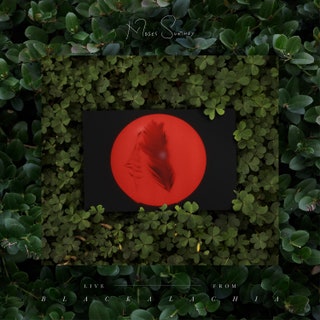Recorded in the Blue Ridge Mountains with a seven-piece band, Moses Sumney’s first live album and film find freedom and beauty in the isolation of the forest.
About 30 minutes into his new concert film Blackalachia, Moses Sumney takes off into the air. He is singing “Plastic” while floating a few feet off the ground, a lone, weightless figure against the sky at dusk. Then, midway through the song, the ropes holding him up suddenly become visible, as though we’re catching behind-the-scenes footage from a movie set. “My wings are made up,” Sumney croons, “and so am I.”
It’s a dizzying effect, one that exposes the structures that constitute our self-presentation—the things that we show, the things that we don’t. In a way, the scene feels like a natural continuation of themes Sumney explored in his most recent album, 2020’s grae: Masculinity, gender, race, the multiplicity of identities that comprise who we are and how we are seen by the world.
Sumney has long grappled with image and perception. Burdened and distracted by what he described as a “cult of personality” attached to being a performer, he left Los Angeles in 2017 and took refuge in Asheville, North Carolina. He was drawn to the city’s natural surroundings—the forest, the sky, the birds—and Live From Blackalachia was born out of this newfound home. Over two days in summer 2020, Sumney and a seven-piece band recorded 13 songs culled from grae and 2017’s Aromanticism live in the Blue Ridge Mountains, an hour outside Asheville. Transported into Blackalachia and away from societal context, the music meets us with open arms.
As sprawling as their environs, the live renditions are all longer than their studio counterparts. The changes are sometimes minute: A note is held longer, a melody delivered more slowly, an instrumental interlude stretched and woven like a climbing vine. “Bless Me,” the longest track on the album, extends to eight minutes as Sumney freestyles off operatic vocal runs, toying with constraint and structure. On “Doomed,” the addition of Serena Wiley and Brian Horton’s saxophones and Derrick Johnson’s trombone adds a sweeping cosmic jazz sensibility. In the companion film, Sumney lies on the grass, twisting and turning, beckoned by the sinuous, organic motion of the music. At their most indulgent, the live takes make the studio versions feel domesticated by comparison.
Perhaps the most noticeable aspect of Live From Blackalachia is how undiluted each performer is, even at such length. Without his signature vocal harmonies, Sumney sounds more alone than ever. “In Bloom (in the woods),” the most radical reimagining, pares down the symphonic production of the original to basic string elements: A cello pulses underneath Sumney’s voice; a lone plucked violin evolves into frantic bows. The first third of a newly dynamic version of “Me in 20 Years” does away with many of the production flourishes and vocal layers in favor of a singular, slow-burning sensuality. When the song bursts open at the chorus, it’s like sunbeams on your eyes.
But Sumney is also joined by new company: Crickets chirp in the background; wind hums in the trees. Set atop living, breathing soil, the maximalist pizzazz of a song like “Virility” is imbued with earthy energy. Its wild-hearted outro rises and falls in a thunderous roar, as though the ground beneath were quaking. Live From Blackalachia has just one newly written track, an interlude titled “Space Nation Race Place.” When it plays in the film, Sumney lies naked in a bathtub in the middle of a field, his body garlanded with orange flowers. As the camera zooms out, he becomes smaller and smaller, eventually replaced by a shot of passing trees, like they’re one and the same. “I’ve needed a space to articulate my own loneliness, not at the level of state, or nation, or race, or place,” he recites. In Blackalachia, his isolation becomes a means to freedom and connection—an oceanic feeling so profuse and lush that it invites us in. As the interlude ends, the camera settles among the shrubs, Wiley emerges from the woods with her sax, and the first notes of “Colouour” drift forth like a greeting.








%20Music%20Album%20Reviews.webp)







0 comments:
Post a Comment